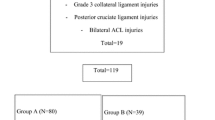Abstract
Purpose
The purpose of the present research was to translate the original English version of International Knee Documentation Committee (IKDC) Subjective Short Form to Persian and to assess validity and reliability of it in Iranian patients with ACL injury.
Method
The Persian version of the IKDC Subjective Short Form was administered to 145 patients including 111 men (76 %) and 34 women (24 %) with the clinical diagnosis of knee ACL tear that were referred to our Knee and Shoulder Center at Mashhad University of Medical Sciences, Mashhad, Iran. The Persian IKDC Subjective Short Form and Persian SF-36 questionnaire were completed by patients in the clinic before beginning any treatment intervention. Patients filled out the Persian IKDC 72 h again before receiving a major treatment; we were then able to use the test–retest method to calculate reliability.
Results
The average age of the subjects was 30.9 ± 10.4 years. The calculated ICC with 95 % confidence interval was 0.845. In this study, Cronbach’s alpha was 0.845. There were significant correlations between mean total score of the Persian IKDC and all items of the SF36 (P < 0.05) except for MCS (P = 0.055).
Conclusion
Cronbach’s alpha and correlation of IKDC Subjective Short Form and SF-36 demonstrated that the Persian version of IKDC has both strong reliability and validity. The Iranian version of IKDC has favourable validity and reliability and therefore can be used to assess Persian-speaking patients with cruciate ligament injuries.
Level of evidence
Level II.
Similar content being viewed by others
References
Beaton DE, Bombardier C, Guillemin F, Ferraz MB (2000) Guidelines for the process of cross-cultural adaptation of self-report measures. Spine 25(24):3186–3191
Collins NJ, Misra D, Felson DT, Crossley KM, Roos EM (2011) Measures of knee function: International Knee Documentation Committee (IKDC) Subjective Knee Evaluation Form, Knee Injury and Osteoarthritis Outcome Score (KOOS), Knee Injury and Osteoarthritis Outcome Score Physical Function Short Form (KOOS-PS), Knee Outcome Survey Activities of Daily Living Scale (KOS-ADL), Lysholm Knee Scoring Scale, Oxford Knee Score (OKS), Western Ontario and McMaster Universities Osteoarthritis Index (WOMAC), Activity Rating Scale (ARS), and Tegner Activity Score (TAS)”. Arthritis Care Res (Hoboken) 63:208–228
Ferraz MB (1997) Cross cultural adaptation of questionnaires: what is it and when should it be performed [editorial; comment]? J Rheumatol 24:2066–2068
Fu SN, Chan YH (2011) Translation and validation of Chinese version of International Knee Documentation Committee Subjective Knee Form. Disabil Rehabil 33(13–14):1186–1189
Guillemin F, Bombardier C, Beaton D (1993) Cross-cultural adaptation of health-related quality of life measures: literature review and proposed guidelines. J Clin Epidemiol 46(12):1417–1432
Guyatt GH (1993) The philosophy of health-related quality of life translation. Qual Life Res 2:461–465
Hendricson WD, Russell IJ, Prihoda TJ, Jacobson JM, Rogan A, Bishop GD, Castillo R (2000) Development and initial validation of a dual-language English–Spanish format for the arthritis impact measurement scales. Spine 24:25
Kim JG, Oh SJ, Lee MC, Seo SS, Choi CH, Yoo JH (2008) Cross cultural adaptation and translating the IKDC Subjective Form into the Korean language. J Korean Knee Soc 20(2):161–168
Kong DH, Yang SJ, Ha JK, Jang SH, Seo JG, Kim JG (2012) Validation of functional performance tests after anterior cruciate ligament reconstruction. Knee Surg Relat Res 24(1):40–45
Lertwanich P, Praphruetkit T, Keyurapan E, Lamsam C, Kulthanan T (2008) Validity and reliability of Thai version of the International Knee Documentation Committee Subjective Knee Form. J Med Assoc Thai 91(8):1218–1225
Metsavaht L, Leporace G, Riberto M, de Mello Sposito MM, Batista LA (2010) Translation and cross-cultural adaptation of the Brazilian version of the International Knee Documentation Committee Subjective Knee Form: validity and reproducibility. Am J Sports Med 38(9):1894–1899
Montazeri A, Goshtasebi A, Vahdaninia M, Gandek B (2005) The Short Form Health Survey (SF-36): translation and validation study of the Iranian version. Qual Life Res 14(3):875–882
Motamed N, Ayatollahi AR, Zare N, Sadeghi-Hassanabadi A (2005) Validity and reliability of the Persian translation of the SF-36 version 2 questionnaire. East Mediterr Health J 11(3):349–357
Natalie J, Collins Devyani Misra, Felson DT, Crossley KM, Roos EM (2011) Measures of knee function. Arthritis Care Res 63(11):S208–S228
Padua R, Bondi R, Ceccarelli E, Bondi L, Romanini E, Zanoli G, Campi S (2004) Italian version of the International Knee Documentation Committee Subjective Knee Form: cross-cultural adaptation and validation. Arthroscopy 20(8):819–823
Schmitt LC, Paterno MV, Huang S (2010) Validity and internal consistency of the international knee documentation committee subjective knee evaluation form in children and adolescents. Am J Sports Med 38(12):2443–2447
Wagner AK, Gandek B, Aaronson NK, Acquadro C, Alonso J, Apolone G (1998) Cross-cultural comparisons of the content of SF-36 translations across 10 countries: results from the IQOLA Project. International Quality of Life Assessment. J Clin Epidemiol 51:925–932
William DH, Russell IJ, Prihoda TJ, Jacobson JM, Rogan A, Bishop GD, Castillo R (1989) Development and initial validation of a dual-language English-Spanish format for the arthritis impact measurement scales. Arthritis Rheum 32:1153
Acknowledgments
We would like to thank Parand Pajoohesh Institute for their assistance in doing data analysis of the survey.
Conflict of interest
The authors declare no conflict of interest.
Author information
Authors and Affiliations
Corresponding author
Rights and permissions
About this article
Cite this article
Ebrahimzadeh, M.H., Makhmalbaf, H., Golhasani-Keshtan, F. et al. The International Knee Documentation Committee (IKDC) Subjective Short Form: a validity and reliability study. Knee Surg Sports Traumatol Arthrosc 23, 3163–3167 (2015). https://doi.org/10.1007/s00167-014-3107-1
Received:
Accepted:
Published:
Issue Date:
DOI: https://doi.org/10.1007/s00167-014-3107-1




